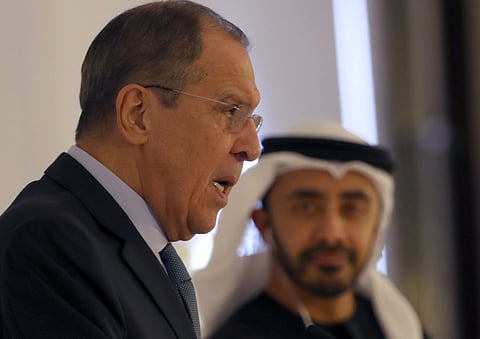Russia strengthens bond with GCC
Improvement in relations with Moscow not coming at the expense of historic ties with US

The current tour by Russian Foreign Minister Sergei Lavrov to a number of Gulf states, including the UAE, comes at a crucial time for the region and will have a far-reaching outcome on Gulf-Russian ties. Moscow has been boosting its relations with Arab countries recently in a way that reflects its growing regional influence.
During his visits to the UAE, Saudi Arabia, Kuwait and Qatar, Lavrov is expected to discuss a number of issues including the situation in Syria, the conflict in Yemen, the Libyan crisis, Iran’s regional agenda and the Palestinian-Israeli settlement, among other things. Bilateral ties and expanding joint economic cooperation in various fields, including tourism, energy and space will also be discussed.
The visit comes a month before the convening of a Russian-Arab cooperation forum, which will be held at the ministerial level on April 17 in Moscow. The meeting will focus on resuming joint work within the framework of the strategic dialogue between Russia and the GCC, according to a Russian Foreign Ministry statement.
“Regarding Syria, we intend to inform our Arabian partners about the situation in Idlib, in Syria’s northeast, the efforts being made within the framework of the Astana format to eliminate remaining terrorist groups on Syrian territory, as well as to form and launch the work of the constitutional committee,” the ministry said.
President Vladimir Putin is expected to visit Riyadh sometime this year and observers believe the trip will be a milestone in Russia’s ties with Saudi Arabia and the rest of the Gulf states.
Russia has become a major regional player in the past few years, especially after its intervention in the Syrian civil war. Its partnership with Iran and Turkey through the Astana process has contributed to a number of understandings and agreements, including the creation of de-escalation zones. Moscow hopes the GCC can play a future role in the reconstruction of Syria.
But disagreements remain over the return of Syria to the Arab League and restoring diplomatic ties with Damascus.
Other areas where Russia can play a positive role include the conflict in Yemen and the Libyan crisis. In Yemen, Moscow’s relations with Tehran could reflect on Iran’s backing of the Al Houthis, who have reneged on all agreements and understandings to end the conflict. Iran’s military support of Al Houthis has prolonged the crisis and destroyed the country’s institutions. It is hoped that Moscow can put pressure on Tehran to push the Al Houthis to accept a political settlement.
With the current US administration adopting a series of hostile measures against the Palestinians — the latest step was the closure of the US consulate in Occupied East Jerusalem — Russia can play a major role in keeping the world’s eyes focused on a just political settlement. Moscow has been critical of the so-called Trump Middle East peace plan, which is expected to be unveiled in April following the Israeli elections.
The plan will polarise the Arab world and Washington is expected to pressure its Arab allies into embracing it. Russia, as well as China and the EU, will play a vital role in stressing the right of Palestinians to self-determination as well as in supporting the Arab peace initiative as a gateway to a just settlement of the conflict.
Russia’s role in working with Opec to control oil prices and output is also significant. Moscow has become a major player in the energy market, an issue that is of utmost importance for most GCC countries.
But there are other areas where the GCC states can benefit from a closer relationship with Russia. Moscow is interested in boosting trade, investment, tourism, agriculture and industry. That relationship will work both ways as Russia is now a main attraction for foreign investors.
But mostly what the region needs is a balanced relationship with all. Last year saw an important visit to the UAE by Chinese President Xi Jinping where 13 agreements and memoranda of understanding were signed between the two countries aiming at strengthening strategic partnerships and bilateral cooperation in various sectors.
Improving ties with Russia should contribute to achieving regional stability at a time when the US is shifting its geopolitical attention elsewhere. This improvement in GCC-Russia ties should not be seen as coming at the expense of the close historical relations that Washington has with the Gulf states.
Osama Al Sharif is a journalist and political commentator based in Amman.



